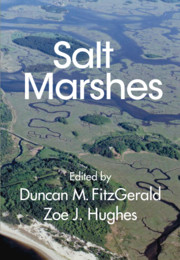Book contents
- Salt Marshes
- Salt Marshes
- Copyright page
- Contents
- Contributors
- Acknowledgments
- 1 State of Salt Marshes
- Part I Marsh Function
- Part II Marsh Dynamics
- 7 Marsh Equilibrium Theory
- 8 Salt Marsh Ecogeomorphic Processes and Dynamics
- 9 Salt Marsh Sediments as Recorders of Holocene Relative Sea-Level Change
- 10 Storm Processes and Salt Marsh Dynamics
- 11 Understanding Marsh Dynamics
- 12 Understanding Marsh Dynamics
- Part III Marsh Response to Stress
- Index
- References
7 - Marsh Equilibrium Theory
Implications for Responses to Rising Sea Level
from Part II - Marsh Dynamics
Published online by Cambridge University Press: 19 June 2021
- Salt Marshes
- Salt Marshes
- Copyright page
- Contents
- Contributors
- Acknowledgments
- 1 State of Salt Marshes
- Part I Marsh Function
- Part II Marsh Dynamics
- 7 Marsh Equilibrium Theory
- 8 Salt Marsh Ecogeomorphic Processes and Dynamics
- 9 Salt Marsh Sediments as Recorders of Holocene Relative Sea-Level Change
- 10 Storm Processes and Salt Marsh Dynamics
- 11 Understanding Marsh Dynamics
- 12 Understanding Marsh Dynamics
- Part III Marsh Response to Stress
- Index
- References
Summary
The analysis presented here was motivated by an objective of describing the interactions between the physical and biological processes governing the responses of tidal wetlands to rising sea level and the ensuing equilibrium elevation. We define equilibrium here as meaning that the elevation of the vegetated surface relative to mean sea level (MSL) remains within the vertical range of tolerance of the vegetation on decadal time scales or longer. The equilibrium is dynamic, and constantly responding to short-term changes in hydrodynamics, sediment supply, and primary productivity. For equilibrium to occur, the magnitude of vertical accretion must be great enough to compensate for change in the rate of sea-level rise (SLR). SLR is defined here as meaning the local rate relative to a benchmark, typically a gauge. Equilibrium is not a given, and SLR can exceed the capacity of a wetland to accrete vertically.
- Type
- Chapter
- Information
- Salt MarshesFunction, Dynamics, and Stresses, pp. 157 - 177Publisher: Cambridge University PressPrint publication year: 2021
References
- 8
- Cited by

